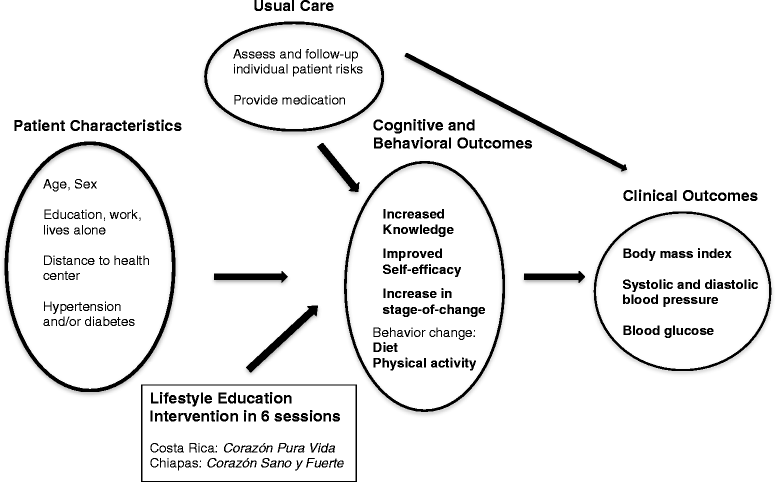Impact evaluation of a healthy lifestyle intervention to reduce cardiovascular disease risk in health centers in San José, Costa Rica and Chiapas, Mexico
- PMID: 26711290
- PMCID: PMC4693408
- DOI: 10.1186/s12913-015-1248-7
Impact evaluation of a healthy lifestyle intervention to reduce cardiovascular disease risk in health centers in San José, Costa Rica and Chiapas, Mexico
Abstract
Background: Previous healthy lifestyle interventions based on the Salud para Su Corazón curriculum for Latinos in the United States, and a pilot study in Guatemala, demonstrated improvements in patient knowledge, behavior, and clinical outcomes for adults with hypertension. This article describes the implementation of a healthy lifestyle group education intervention at the primary care health center level in the capital cities of Costa Rica and Chiapas, Mexico for patients with hypertension and/or type 2 diabetes and presents impact evaluation results.
Methods: Six group education sessions were offered to participants at intervention health centers from November 2011 to December 2012 and participants were followed up for 8 months. The study used a prospective, longitudinal, nonequivalent pretest-posttest comparison group design, and was conducted in parallel in the two countries. Cognitive and behavioral outcome measures were knowledge, self-efficacy, stage-of-change, dietary behavior and physical activity. Clinical outcomes were: body mass index, systolic and diastolic blood pressure, and fasting blood glucose. Group by time differences were assessed using generalized estimating equation models, and a dose-response analysis was conducted for the intervention group.
Results: The average number of group education sessions attended in Chiapas was 4 (SD: 2.2) and in Costa Rica, 1.8 (SD: 2.0). In both settings, participation in the study declined by 8-month follow-up. In Costa Rica, intervention group participants showed significant improvements in systolic and diastolic blood pressure and borderline significant improvement for fasting glucose, and significant improvement in the stages-of-change measure vs. the comparison group. In Chiapas, the intervention group showed significant improvement in the stages-of-change measure in relation to the comparison group. Significant improvements were not observed for knowledge, self-efficacy, dietary behavior or physical activity. In Chiapas only, a significant dose-response relationship was observed for systolic and diastolic blood pressure.
Conclusion: Group education interventions at health centers have the potential to improve stage-of-change activation, and may also improve clinical outcomes. In the future, it will be essential to dedicate resources to understand ways to reach a representative group of the patient population, tailor the intervention so that patients are engaged to participate, and consider the broader family and community context that influences patients' capacity to manage their condition.
Figures
Similar articles
-
Barriers and facilitating factors for disease self-management: a qualitative analysis of perceptions of patients receiving care for type 2 diabetes and/or hypertension in San José, Costa Rica and Tuxtla Gutiérrez, Mexico.BMC Fam Pract. 2013 Sep 4;14:131. doi: 10.1186/1471-2296-14-131. BMC Fam Pract. 2013. PMID: 24007205 Free PMC article.
-
Improving heart healthy lifestyles among participants in a Salud para su Corazón promotores model: the Mexican pilot study, 2009-2012.Prev Chronic Dis. 2015 Mar 12;12:E34. doi: 10.5888/pcd12.140292. Prev Chronic Dis. 2015. PMID: 25764140 Free PMC article.
-
Opportunities for involving men and families in chronic disease management: a qualitative study from Chiapas, Mexico.BMC Public Health. 2015 Oct 5;15:1019. doi: 10.1186/s12889-015-2361-6. BMC Public Health. 2015. PMID: 26438195 Free PMC article.
-
Personalized prevention approach with use of a web-based cardiovascular risk assessment with tailored lifestyle follow-up in primary care practice--a pilot study.Eur J Prev Cardiol. 2016 Mar;23(5):544-51. doi: 10.1177/2047487315591441. Epub 2015 Jun 16. Eur J Prev Cardiol. 2016. PMID: 26080811 Review.
-
Epidemiology and control of hypertension and diabetes in Costa Rica.Ren Fail. 2006;28(8):693-6. doi: 10.1080/08860220600946319. Ren Fail. 2006. PMID: 17162428 Review.
Cited by
-
Effectiveness of a provider and patient-focused intervention to improve hypertension management and control in the primary health care setting in Cuba: a controlled before-after study.BMC Prim Care. 2023 Jan 14;24(1):10. doi: 10.1186/s12875-022-01959-6. BMC Prim Care. 2023. PMID: 36641434 Free PMC article.
-
Implementation research on noncommunicable disease prevention and control interventions in low- and middle-income countries: A systematic review.PLoS Med. 2022 Jul 25;19(7):e1004055. doi: 10.1371/journal.pmed.1004055. eCollection 2022 Jul. PLoS Med. 2022. PMID: 35877677 Free PMC article.
-
Characteristics of self-management education and support programmes for people with chronic diseases delivered by primary care teams: a rapid review.BMC Prim Care. 2024 Jan 31;25(1):46. doi: 10.1186/s12875-024-02262-2. BMC Prim Care. 2024. PMID: 38297228 Free PMC article. Review.
-
A Home-Based Type 2 Diabetes Self-Management Intervention in Rural Guatemala.Prev Chronic Dis. 2017 Aug 10;14:E65. doi: 10.5888/pcd14.170052. Prev Chronic Dis. 2017. PMID: 28796597 Free PMC article.
-
A multi-component, community-engaged intervention to reduce cardiovascular disease risk in perimenopausal Latinas: pilot study protocol.Pilot Feasibility Stud. 2021 Jan 6;7(1):10. doi: 10.1186/s40814-020-00756-1. Pilot Feasibility Stud. 2021. PMID: 33407947 Free PMC article.
References
Publication types
MeSH terms
Grants and funding
LinkOut - more resources
Full Text Sources
Other Literature Sources


